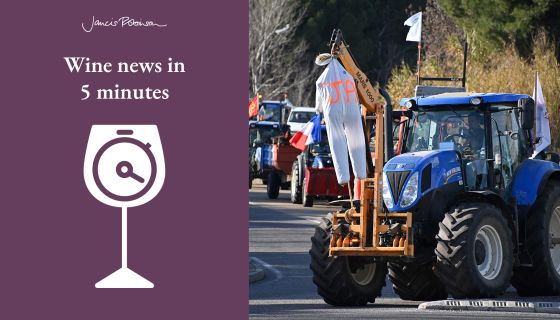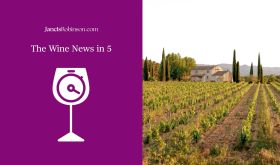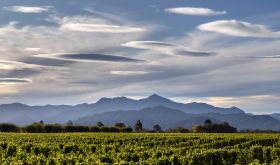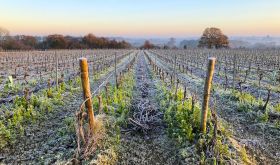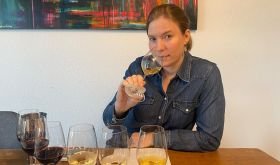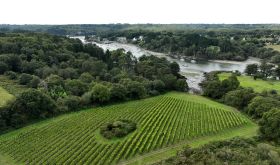First up – the ongoing tumult in southern France
I first told you about this on the second ever wine news broadcast on 6 November – at that time I spoke about the protests on 19 October, where French growers attacked a lorry on the Spanish–French border and tanks of Spanish wine and crates of cava were destroyed. Since then, there have been ongoing protests and in the last few weeks things have escalated. The following information is taken from dozens of articles on Reuters.
On 18 January farmers blocked the A64 motorway around Toulouse.
On 19 January the Comité d’Action Viticole (CAV) blew up the ground floor of the Regional Directorate for Environment, Planning and Housing in Carcassonne, which governs environmental quality and protections. No one was injured.
On the evening of 22 January farm unions met with Prime Minister Gabriel Attal. It seems that the meeting was not to their satisfaction because they sent out new convoys of tractors to block roads from Toulouse to the Basque Country and Toulouse to Bordeaux that night.
On 23 January at 5.45 am, while it was still dark, a car crashed through hay roadblocks and killed cattle- and corn-farmer Alexandra Sonac and her daughter. Sonac’s husband remains in intensive care. The incident does not appear to have been deliberate.
On 25 January the protests intensified further and manure, hay and pallets were deposited and burned outside government buildings and around supermarket retailers who import large quantities of foreign wine and produce. There was also an incident in which a group of winegrowers invaded a large négociant in Nîmes and emptied tanks of wine.
The protests now threaten to disrupt Paris. On Monday 29th, some farmers’ unions are reported to have been setting up roadblocks around the capital.
There have been similar smaller protests in Germany, Romania, the Netherlands and Poland.
The stated reason is price pressures, taxes and green regulations, but that needs more explanation into each of those.
Dramatic inflation, in part caused by Russia’s invasion of Ukraine last year and the subsequent disruption in supply chain and rise in commodity prices, has made increasing food prices (including wine) difficult for consumers. In June of last year food costs in France were 13.7% higher than in 2022. This has caused the French government to put pressure on supermarkets to lower food prices. Which means supermarkets are urging farmers to keep prices down, sometimes pressuring them to sell below farming costs.
Meanwhile farming has only gotten harder in the face of climate change and most farmers are struggling with irrigation regulations (in the case of wine, irrigation can only be used with government permission). Most farmers can’t produce as much as they would if they had access to more water.
Last year French farmers were also affected by floods in the north of the country and there was a cattle-disease outbreak in the south. And, as we know, the wine industry is facing additional pressure in the form of declining consumption. Farmers are also being hit with higher fuel costs and the French government recently announced that they would be reducing state subsidies on agricultural diesel – a plan they cancelled last Friday.
If that wasn’t enough, environmental regulations and animal welfare regulations have been tightening. Stricter regulations of agricultural chemicals mean more handwork rather than herbicide and pesticide use, and they require more tractor passes, which increases fuel use, and, when chemical and fertiliser inputs are first reduced, it can result in lower yields. All of this has meant that farmers can barely cover costs for energy, inputs and transportation of goods.
Rubbing salt in the wound, the EU has been focusing on expanding free-trade deals and has been in negotiations with Mercosur countries regarding agricultural commodities, but those countries aren’t held to the same environmental standards as EU farmers. So large quantities of imports are putting downward pressures on domestic prices but without being held to the same environmental standards. In the face of protests, Mercosur negotiations were cancelled today.
It remains to be seen what the government is going to do, but it seems that farmers’ growing support of far-right candidates who are promising to scale back environmental protections and foreign imports has made Macron’s government uneasy. They’ve paused their new draft on farming law until they can consult with farming representatives. They’ve also eased restrictions on water use.
On a personal note, I struggle with this news. I support farmers. I also support environmental regulations. So, here’s what I’ll recommend …
Wherever you are in the world, if you are an advocate for small farmers, organic produce or environmental regulations and you have the luxury of being able to spend more on food and spend it closer to the farmer in the supply chain, I urge you to shop at your farmers’ market, subscribe for a community-supported agricultural share, support local supermarkets. If you can’t because of pricing, I understand. But this isn’t just a problem for France. The more we ask of farmers, the more we need to be willing to pay. While food prices seem high, in reality they are much lower than in previous decades. Because I was unable to find data on how much of French income is spent on food each year, I have pulled a study from the USDA Economic Research Service, that shows that in the US we now pay 11.3% of our income on average compared to 17.5% in 1960. Food cost is less in the US than in many countries but the point stands that food is not that much less valuable than it was in 1960 and farming is not that much easier; our modern economy has just prioritised less valuable things. But please imagine what happens if in France, the EU’s largest agricultural producer accounting for 18% of EU production, all the current farmers leave the profession because they can’t pay their bills …
Agriculture is life. It should be valued above technology, travel, fashion, and any of the other goods or services we regularly spend on. If you can find one area to cut expenses so that you can support better farming – do it. If we continue to look for the lowest price, we can’t ask more of our farmers. If farmers no longer want their job, we’re all screwed.
On to Vintage Wine Estates …
Vintage Wine Estates is a portfolio of US West Coast wine and cider brands. Last Monday, Wine-Searcher reported that their stock declined 84% last year. Then on Friday, Wine-Searcher reported that 92 layoffs had been reported to the state of California. Apparently VWE plans to keep BR Cohn, Girard, Kunde, Layer Cake, Cherry Pie and Ace Cider and plans to sell Clos Pegase and Viansa. It remains to be seen what will be done with their other brands of which the best known are Qupé, Cameron Hughes and Owen Roe.
On to Saudi Arabia …
It is illegal for Saudi Arabian citizens to drink but the country is opening its first liquor store. The liquor store is currently under construction and will be for foreign diplomats only. It is located in the capital city of Riyadh. The Wall Street Journal also reported in September of last year that the country has plans to open a beach resort that will be allowed to serve alcohol in a play to increase tourism.
Finally, on to the California Department of Food and Agriculture …
The department has established a work group to begin defining regenerative agriculture for the state. According to the global certifier, Regenerative Organic Alliance, regenerative agriculture is a collection of practices that focuses on regenerating soil health and the full-farm ecosystem and sets a high standard for human and animal welfare. While it seems odd that CDFA is defining this after the ROA is already certifying it, this is also what happened when organic agriculture began; there were independent certifiers prior to the USDA defining and regulating organic and many of these organisations are still certifying. The CDFA plans to take input from the public and submit a draft definition in June. The first public meeting will be 31 January in the CDFA Auditorium at 1220 N Street in Sacramento, CA, and you can RSVP at the CDFA website.
This is a transcript of our weekly five-minute news broadcast, which you can watch below. If you have breaking news in your area, please email news@jancisrobinson.com. And if you enjoy this content, and would like to see more like it, please subscribe to our site. Image credit: Sylvain Thomas via Getty.

